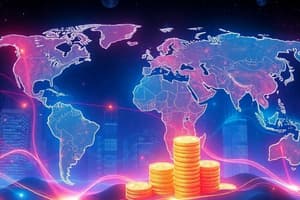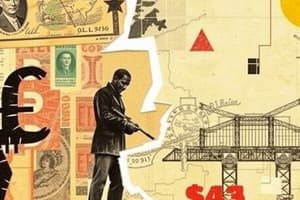Podcast
Questions and Answers
What is one of the factors that can make international trade uncertain?
What is one of the factors that can make international trade uncertain?
- Fixed government policies
- Movements in exchange rates (correct)
- Consistent supply levels
- Stable demand conditions
What term describes when a nation's currency gets stronger?
What term describes when a nation's currency gets stronger?
- Appreciation (correct)
- Revaluation
- Devaluation
- Depreciation
What happens when a nation's currency gets weaker?
What happens when a nation's currency gets weaker?
- Revaluation
- Appreciation
- Devaluation
- Depreciation (correct)
What is the impact on UK exports when the exchange rate rises?
What is the impact on UK exports when the exchange rate rises?
What typically increases when there is a shortage of skilled workers?
What typically increases when there is a shortage of skilled workers?
Which of the following is a potential consequence of businesses being unable to attract high-quality skilled workers?
Which of the following is a potential consequence of businesses being unable to attract high-quality skilled workers?
What is the likely outcome if labor shortages continue for a long period of time?
What is the likely outcome if labor shortages continue for a long period of time?
What does it mean for a currency to be 'revalued'?
What does it mean for a currency to be 'revalued'?
If a UK firm buys goods from a US supplier, and the exchange rate rises, how does this affect the UK importer?
If a UK firm buys goods from a US supplier, and the exchange rate rises, how does this affect the UK importer?
What action do many businesses take to protect themselves from dramatic exchange rate fluctuations?
What action do many businesses take to protect themselves from dramatic exchange rate fluctuations?
What is the term used to describe the risk that future cash flows will change due to unexpected exchange rate fluctuations?
What is the term used to describe the risk that future cash flows will change due to unexpected exchange rate fluctuations?
What happens to UK exports when the exchange rate depreciates?
What happens to UK exports when the exchange rate depreciates?
What is the most powerful international currency mentioned?
What is the most powerful international currency mentioned?
What might a government wish to do, if the exchange rate is fixed?
What might a government wish to do, if the exchange rate is fixed?
What is the risky practice of buying assets, such as shares, currency or property, in the hope that they will be sold in the future at a higher price described as?
What is the risky practice of buying assets, such as shares, currency or property, in the hope that they will be sold in the future at a higher price described as?
What is the main concern of employers regarding skills shortages?
What is the main concern of employers regarding skills shortages?
An appreciation of the Australian currency is good news for exporters if?
An appreciation of the Australian currency is good news for exporters if?
Why might businesses become uncompetitive, if a currency rises due to speculation?
Why might businesses become uncompetitive, if a currency rises due to speculation?
What is the most serious financial risk facing an international firm?
What is the most serious financial risk facing an international firm?
How did the Chinese government maintain a fixed exchange rate?
How did the Chinese government maintain a fixed exchange rate?
Flashcards
Exchange Rate
Exchange Rate
The price of one currency expressed in terms of another currency. Like all prices, they fluctuate due to market forces.
Currency Appreciation
Currency Appreciation
When a currency becomes stronger, allowing it to buy more of another currency. It means the currency's value has increased relative to another.
Currency Revaluation
Currency Revaluation
When a government intentionally increases the fixed exchange rate of its currency, making it stronger.
Currency Depreciation
Currency Depreciation
Signup and view all the flashcards
Currency Devaluation
Currency Devaluation
Signup and view all the flashcards
Fixed Contracts
Fixed Contracts
Signup and view all the flashcards
Economic Risk
Economic Risk
Signup and view all the flashcards
Skills Shortages
Skills Shortages
Signup and view all the flashcards
Price Elasticity of Demand
Price Elasticity of Demand
Signup and view all the flashcards
Currency Speculation
Currency Speculation
Signup and view all the flashcards
Study Notes
- Exchange rate fluctuations are a factor introducing uncertainty into international trade
- The exchange rate represents the price of one currency relative to another
- Like all prices, exchange rates are subject to change due to market forces and shifts in supply and demand
- Exchange rate changes impact businesses involved in exporting or importing
Appreciation and Revaluation
- Currency appreciation occurs when a nation's currency becomes stronger, allowing it to purchase more of another currency
- The pound's value against the euro experienced appreciation between early and mid-2015, rising from £1 = €1.27 to £1 = €1.41, marking a 12.5% increase
- A minority of countries operate with fixed exchange rates, which remain constant
- Governments can revalue their currency by raising the exchange rate to reflect a stronger valuation
Depreciation and Devaluation
- Currency depreciation happens when a nation's currency weakens, reducing the amount of another currency it can purchase
- The pound's value against the euro saw a sharp depreciation after the Brexit vote in June 2016, falling from £1 = €1.31 to £1 = €1.10 in just months, a 16% decrease
- Governments can devalue their currency when the exchange rate is fixed, making it weaker
Impact of Exchange Rate Appreciation on Businesses
- Exchange rate changes can influence demand for exports and imports by altering prices
- When the exchange rate increases from £1 = US$1.50 to £1 = US$2, a UK firm selling £2 million worth of goods to the US will see the dollar price rise from US$3 million to US$4 million, likely decreasing demand for UK exports due to higher costs
- If a UK firm buys US$600000 worth of goods from a US supplier, the price in pounds at the original exchange rate of £1 = US$1.50 is £400000
- When the exchange rate rises to £1 = US$2, the sterling price decreases to £300000, increasing demand for imports as they become cheaper
Impact of Exchange Rate Depreciation on Businesses
- A fall in the exchange rate has the opposite effect on export and import demand, and can impact businesses
- When the exchange rate decreases from £1 = US$1.50 to £1 = US$1.20, a UK firm selling £2 million worth of goods to the US will see the dollar price fall from US$3 million to US$2.4 million, potentially increasing demand for UK exports as they become more affordable
- US$600000 worth of goods from a US supplier at an exchange rate of £1 = US$1.50 costs a UK firm £400000
- When the exchange rate falls to £1 = US$1.20, the sterling price rises to £500000, decreasing demand for imports due to increased costs
Significance of Changes in the Exchange Rate on Business
- The impact of currency depreciation on a business depends on the price elasticity of demand for its products
- For goods with price-inelastic demand, a fall in price has a limited impact on quantity demanded
- For exports with price-elastic demand, there is a larger percentage increase in quantity demanded
- Australian exports may be price inelastic
- Appreciation due to improved efficiency is more sustainable than that due to speculation
Countering Exchange Rate Fluctuations with Fixed Contracts
- Businesses use fixed contracts to mitigate the impact of exchange rate fluctuations, offering a buffer against temporary changes
- Prices for raw materials are often set 12 to 18 months in advance, and exporters use financial instruments to protect against dramatic changes
- Fixed contracts reduce uncertainty but also create delays in the impact of exchange rate changes on business
Economic Risk
- Firms in international trade face economic risks from exchange rate movements
- Long-term risks arise when low-cost production areas appreciate in currency
- Firms that built factories in China in the 1990s, relying on the Chinese government's fixed exchange rate with the US dollar, saw their low-cost advantages diminish as the yuan appreciated
- Economic risk is defined as the risk that future cash flows will change due to unexpected exchange rate fluctuations
- Managing economic risk requires analysis of political, regulatory, and cultural environments
- The US dollar significantly influences international trade
Skills Shortages and Their Impact on International Competitiveness
- Many industries need to recruit skilled workers, and are facing skill shortages
- Skills shortages are present in the USA, Australia, New Zealand, Canada, and the UK
- Manufacturing sees a particular struggle in the recruiting of skilled workers
- If businesses cannot recruit skilled staff, international competitiveness is threatened
Main effects of skills shortages
- There is upward pressure on wages due to restricted supply of labour
- Quality of output may be negatively affected
- Lower levels of productivity due to production delays
- Loss of business if labour shortages continue for a long period
Studying That Suits You
Use AI to generate personalized quizzes and flashcards to suit your learning preferences.





